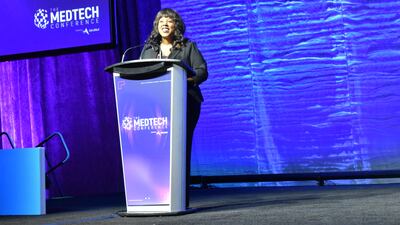
North America

The US FDA’s advisory panel on general and plastic surgery devices voted in favor of agency approval for a novel medical device for treating early stage, low-risk breast cancer as a potential alternative to lumpectomy. The agency is expected to make its decision on the device early next year.

AdvaMed is calling on Medicare to provide coverage for supplemental screenings for women with dense breasts, an anatomical characteristic that puts them at a higher risk for cancer. The trade group says the lack of coverage for additional imaging results in many women not receiving potentially lifesaving follow-up.

Republican presidential candidate Donald Trump says he will let Robert F. Kennedy Jr. “go wild on medicines” if he wins the White House. That could spell challenges for the US FDA in 2025.

Former Food and Drug Law Institute CEO Amy Comstock Rick will take on patient engagement for the US FDA Rare Disease Hub as director of strategic coalitions.

The US FDA’s Patient Engagement Advisory Committee met Wednesday to discuss ways the agency can empower patients thinking about whether to participate in clinical trials of regulated medical products. Central to the committee’s discussion was not only the type of information patients need to evaluate when considering joining a study, but how that information should be presented to them.

Recognizing October as cybersecurity awareness month, the US FDA has added new publications to its list of resources concerning the cybersecurity of medical devices.

This week, Medtronic and Hologic announced major safety issues; the US government awarded $110m to innovators in women’s health; CDC partnered with Quest on a bird flu diagnostic; and more.

When former FDAer Steve Silverman last wrote for us, there was no formal successor to Jeff Shuren as director of CDRH. With the elevation of acting director Michelle Tarver, the future is becoming more clear.

The US FDA has published a final guidance document providing stakeholders with a framework for various safety evaluations they should consider when developing medical products for newborns, including devices. The guidance focuses on long-term evaluations of neurodevelopmental safety.

House Republicans say the FDA has not done enough to support its laboratory safety office, despite past recommendations.

Acting director Michelle Tarver has been named the new permanent director of the US FDA’s Center for Devices and Radiological Health.

During the Medtech Conference in Toronto, a panel of industry leaders discussed the gaps that remain in women’s healthcare and said innovation can help narrow them.

This week, Hologic announced it would pay $350m for uterine fibroid treatment firm Gynesonics; the US FDA authorized a Novocure cancer treatment and a surgical robot from CMR Surgical; and the IMDRF announced 15 new members.

In her inaugural address to the medtech industry during the Medtech Conference, acting US CDRH director Michelle Tarver described her mission-driven approach.

As the 6 May deadline to implement the FDA’s final rule on lab-developed tests approaches, attempts to stop the rule from taking effect are set to play out in court. A panel of experts discussed the potential impact of these legal efforts, should they be successful, at the Medtech Conference in Toronto.

During the Medtech Conference in Toronto, three of the industry’s leading CEOs shared their insights into the rapidly changing landscape of health care and how the latest advancements have the potential to make life better for patients everywhere.

Slow adoption of alternatives to animal testing in the current decentralized regulatory framework shows the need for a ‘one-stop shop’ at FDA that can provide advice, precedents and qualification programs.

The US FDA has released its annual list of planned guidance documents for the upcoming fiscal year. While many topics on the list are familiar, a new “Under Construction” list shows rising priorities.

The College of American Pathologists wants a US district court to scrap the FDA’s final rule that unilaterally assumes oversight of lab-developed tests, but not because the college feels the agency has no business regulating them. Helena Duncan, senior director of quality at CAP, explained the college’s position to Medtech Insight.
